History
The National Rural League (Reichs-Landbund) was established in 1921 by the merger of the two major Protestant right-wing farmers' organizations German Agrarian League (BDL) and German Landbund to more effectively advance agrarian interests to be able to prevail against the resurgent forces of labor and big business. The leadership pursued an anti-democratic, nationalist course with rejection of the Weimar Republic, at the same time under the existing system it attempted to maintain as much influence as possible for the big Junker landowners from east of the Elbe. The large landowners from East of the Elbe were strongly represented in the governing bodies. The Reich Landbund was the most influential German farmers' association during the Weimar Republic. Particular focus of the association were Pomerania, Brandenburg, Silesia, Thuringia, East Hanover and Hesse. It could not gain a foothold with rural society in the rural areas of the Catholic regions of the empire of the Empire. Here, the Association of the German Farmers Associations dominated.
The National Rural League created a strong central organization with connections to numerous newspapers. In 1928 there were 190 press organs associated with the National Rural League, belonging to it, or belonging to members of the association. In 1924 the league had about 500 district offices. As a result, in the areas were the organization was strong large parts of the agricultural population that were not members of the National Rural League could be greatly influenced by League positions.
Politically the National Rural League was near the German National People's Party (DNVP) because both were opposed to the Republic. In 1924 the party supported this association particularly strongly, but also promoted candidacies of senior members of other right-wing parties, especially the German People's Party (DVP). In the 1925 German presidential election, the National Rural League supported the election of Paul von Hindenburg. In the mid-1920s, leading National Rural League members of the DNVP were represented in the government.
This phase of government cooperation was short-lived. Import tariff issues and the agrarian crisis exacerbated the distance between the League and the government and the Republic. The support of the government had led, especially in Hesse and Silesia, to massive membership losses. Rural League officials were involved with the 1927/28 country people's movement. They split several Landbund leaders from the DNVP and founded the Christian-National Peasants' and Farmers' Party (CNBLP, The CNBLP was renamed German Country People's in 1930). The new party took 10 seats from the DNVP in the 1928 Reichstag elections. There was significant turbulence within National Rural League. The battle against other farmers' organizations was largely discontinued. In order to obtain greater influence in the agricultural and economic crisis, in 1929 the National Rural League was the driving force establishing a new umbrella organization of farmers' associations, the Green Front.
In 1929 The National Rural League supported the 1929 German referendum against the Young Plan which was initiated by the DNVP, Nazi Party (NSDAP ) and other legal associations. Through their leading member, Martin Schiele, the National Rural League was involved in the government of Heinrich Brüning, which led to the expulsion of the Schiele group from the DNVP and helped the German Country People's Party (CNBLP) to make large gains in the 1930 German federal election. However, as the Nazi Party achieved great progress in the countryside with construction of their agrarian political apparatus, the Nazis now gained more and more influence in the National Rural League. In October 1930 Martin Schiele had to resign as President of the National Rural League, and the new board moved to the right. The Schiele group was repressed and the Nazis gained ground. Other groups in the National Rural League believed they could win back lost ground in agriculture through an alliance with the Nazi influence. The agitation against the Brüning Government, democracy and the Weimar Republic increased and in 1931 the National Rural League joined the Harzburg Front. In the presidential election in 1932, the leadership of the National Rural League recommended a vote for the national German Stahlhelm leader Theodor Duesterberg or Adolf Hitler, because Hindenburg had not distanced himself from his support of the Social Democratic Party of Germany (SPD).
The transfer of power to Hitler on 30 January 1933 was welcomed by the League leadership, so that there was no resistance by the largest German agriculture organization to the Nazi Coordination (Gleichschaltung) of agriculture and their state administrative body regulating food production (Reichsnährstand).

The German People's Party was a conservative-liberal political party during the Weimar Republic that was the successor to the National Liberal Party of the German Empire. Along with the left-liberal German Democratic Party (DDP), it represented political liberalism in Germany between 1918 and 1933.

Der Stahlhelm, Bund der Frontsoldaten, commonly known as Der Stahlhelm, was a German First World War veteran's organisation existing from 1918 to 1935. It was part of the "Black Reichswehr" and in the late days of the Weimar Republic closely affiliated to the monarchist German National People's Party (DNVP), placed at party gatherings in the position of armed security guards.
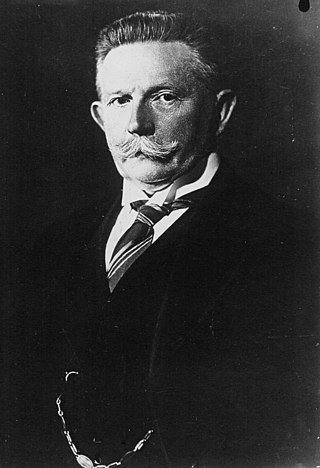
Alfred Ernst Christian Alexander Hugenberg was an influential German businessman and politician. An important figure in nationalist politics in Germany during the first three decades of the twentieth century, Hugenberg became the country's leading media proprietor during the 1920s. As leader of the German National People's Party, he played a part in helping Adolf Hitler become chancellor of Germany and served in his first cabinet in 1933, hoping to control Hitler and use him as his tool. The plan failed, and by the end of 1933 Hugenberg had been pushed to the sidelines. Although he continued to serve as a guest member of the Reichstag until 1945, he wielded no political influence. Following World War II, he was interned by the British in 1946 and classified as "exonerated" in 1951 after undergoing denazification.

Otto Braun was a politician of the Social Democratic Party of Germany (SPD) during the Weimar Republic. From 1920 to 1932, with only two brief interruptions, Braun was Minister President of the Free State of Prussia. The continuity of personnel in high office resulted in a largely stable government in Prussia, in contrast to the sometimes turbulent politics of the Reich. During his term of office, Prussia's public administration was reorganized along democratic lines. He replaced many monarchist officials with supporters of the Weimar Republic, strengthened and democratized the Prussian police, and made attempts to fight the rise of the Nazi Party.

The German National People's Party was a national-conservative and monarchist political party in Germany during the Weimar Republic. Before the rise of the Nazi Party, it was the major nationalist party in Weimar Germany. It was an alliance of conservative, nationalist, monarchist, völkisch, and antisemitic elements supported by the Pan-German League. Ideologically, the party was described as subscribing to authoritarian conservatism, German nationalism, monarchism, and from 1931 onwards also to corporatism in economic policy. It held anti-communist, anti-Catholic, and antisemitic views. On the left–right political spectrum, it belonged on the right-wing, and is classified as far-right in its early years and then again from the late 1920s when it moved back rightward.
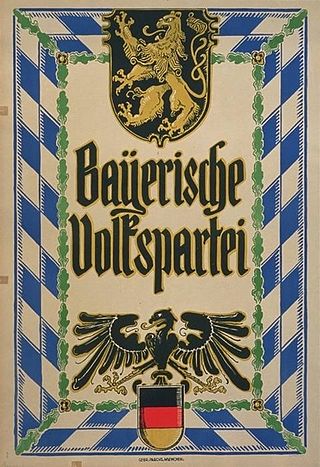
The Bavarian People's Party was a Catholic political party in Bavaria during the Weimar Republic. After the collapse of the German Empire in 1918, it split away from the national-level Catholic Centre Party and formed the BVP in order to pursue a more conservative and particularist Bavarian course. It consistently had more seats in the Bavarian state parliament than any other party and provided all Bavarian minister presidents from 1920 on. In the national Reichstag it remained a minor player with only about three percent of total votes in all elections. The BVP disbanded shortly after the Nazi seizure of power in early 1933.
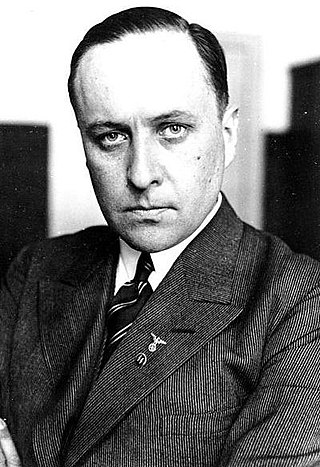
Richard Walther Darré was one of the leading Nazi "blood and soil" ideologists and served as Reich Minister of Food and Agriculture. As the National leader for agricultural policy, he was a high-ranking functionary in the Nazi Party and as a Senior group leader in the SS, he was the seventh most senior commander in that organisation. He was tried and found guilty on three counts at the Ministries Trial.
The Conservative People's Party was a short-lived conservative and Christian democratic political party of the moderate right in the last years of the Weimar Republic. It broke away from the German National People's Party (DNVP) in July 1930 as a result of the DNVP's increasing shift to the right under the leadership of Alfred Hugenberg. It remained a numerically insignificant minor party but was represented in the governments of Heinrich Brüning (1930–1932). The KVP folded on 31 March 1933 after it ran out of funds.
In the fourteen years the Weimar Republic was in existence, some forty parties were represented in the Reichstag. This fragmentation of political power was in part due to the use of a peculiar proportional representation electoral system that encouraged regional or small special interest parties and in part due to the many challenges facing the nascent German democracy in this period.

The Free State of Prussia was one of the constituent states of Germany from 1918 to 1947. The successor to the Kingdom of Prussia after the defeat of the German Empire in World War I, it continued to be the dominant state in Germany during the Weimar Republic, as it had been during the empire, even though most of Germany's post-war territorial losses in Europe had come from its lands. It was home to the federal capital Berlin and had 62% of Germany's territory and 61% of its population. Prussia changed from the authoritarian state it had been in the past and became a parliamentary democracy under its 1920 constitution. During the Weimar period it was governed almost entirely by pro-democratic parties and proved more politically stable than the Republic itself. With only brief interruptions, the Social Democratic Party (SPD) provided the Minister President. Its Ministers of the Interior, also from the SPD, pushed republican reform of the administration and police, with the result that Prussia was considered a bulwark of democracy within the Weimar Republic.

The Christian-National Peasants' and Farmers' Party was an agrarian political party of Weimar Germany. It developed from the German National People's Party (DNVP) in 1928.

The Reichstag of the Weimar Republic (1919–1933) was the lower house of Germany's parliament; the upper house was the Reichsrat, which represented the states. The Reichstag convened for the first time on 24 June 1920, taking over from the Weimar National Assembly, which had served as an interim parliament following the collapse of the German Empire in November 1918.
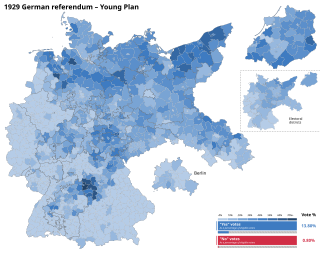
The 1929 German Referendum was an attempt during the Weimar Republic to use popular legislation to annul the agreement in the Young Plan between the German government and the World War I opponents of the German Reich regarding the amount and conditions of reparations payments. The referendum was the result of the initiative "Against the Enslavement of the German People " launched in 1929 by right-wing parties and organizations. It called for an overall revision of the Treaty of Versailles and stipulated that government officials who accepted new reparation obligations would be committing treason.
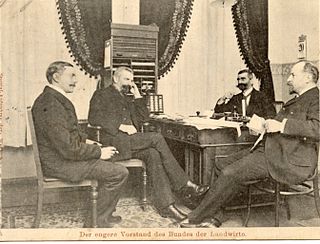
The Bund der Landwirte (BDL) was a German advocacy group founded 18 February 1893 by farmers and agricultural interests in response to the farm crisis of the 1890s, and more specifically the result of the protests against the low-tariff policies of Chancellor Leo von Caprivi, including his free trade policies.
The Association of the German Farmers Associations (VdB) existed from 1900 to 1934 and was an amalgamation of Christian farmers’ organizations. From 1900 to 1916 it was called "Association of Christian German Farmers Associations" and from 1931 to 1934 it used the name "Association of German Christian Farmers Associations".

The Reich Ministry of Food and Agriculture was responsible for the agricultural policy of Germany during the Weimar Republic from 1919 to 1933 and during the Nazi dictatorship of the Third Reich from 1933 to 1945. It was headed by a Reichsminister under whom a state secretary served. On 1 January 1935, the ministry merged with the Prussian Ministry of Agriculture, Domains and Forests, founded in 1879. Until 1938 and the Anschluss with Austria, it was called the "Reich and Prussian Ministry of Food and Agriculture". After the end of National Socialism in 1945 and of the Allied occupation of Germany, the Federal Ministry of Food and Agriculture was established in 1949 as a successor in the Federal Republic of Germany.

Martin Schiele was a German nationalist politician. He was part of the leadership of the German National People's Party (DNVP) from its 1918 founding until Alfred Hugenberg became leader in 1928. He was also the chief representative of the agrarian wing of the DNVP. As a member of Hans Luther's coalition government, Schiele secured the restoration of agricultural and industrial protectionism with the tariff of 1925. As minister of food in 1927–28, he favored state credit as a means for subsidising agriculture.
The Provisional Law and Second Law on the Coordination of the States with the Reich were two laws enacted by the German government of Adolf Hitler to expand its control over the seventeen German states (länder). The Provisional (First) Law dissolved all the sitting landtage, except for that of Prussia, and reconstituted them in accordance with the results of the recent parliamentary election of 5 March 1933, which had given the Nazi Party and its coalition partner, the German National People's Party (DNVP), a majority of the Reichstag seats. The Second Law established the new powerful position of Reichsstatthalter appointed by the central government to effectively take control of each state administration. The effect of these laws was to undermine the power and influence of all political parties other than the Nazis and the DNVP, and to move Germany significantly away from being a federal republic and put it on a path to becoming a unitary state.
Hans Elhard von Morozowicz was a German military officer, a high-ranking official in Der Stahlhelm and a Gruppenführer in the Sturmabteilung (SA). He was also a deputy in the Reichstag and died in an automobile accident at age 40.
Walter Granzow was a German landowner, bank official, Nazi Party politician and SS-Brigadeführer. He served as the Minister-president of the Free State of Mecklenburg-Schwerin from 1932 to 1933. He was also the president and chairman of the board of several large German banks.













